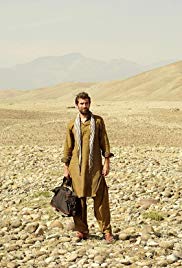
JIRGA
Australia, 2018, 78 minutes, Colour.
Sam Smith, Sher Alam Miskeen Ustad.
Directed by Benjamin Gilmour.
The film comes from a religious perspective, the father of the film’s director and cinematographer, Benjamin Gilmour, was a minister. This humane and religious perspective was also a feature of the first film by this director, Son of a Lion, a story of post-9/11 Pakistan.
It is also an Australian film, the main character a soldier returning to Afghanistan on a personal journey.
We are told immediately that Jirga means a meeting of council elders.
The opening invites its audience into military action, a raid on a village, dangers and shooting, all filmed in green night-light. At the end of the episode, one of the men is filmed staring at what has happened, the death.
The director knows the landscapes of Afghanistan as well as the city of Kabul and audiences may well feel as they look at the cityscapes from above, move through the streets and markets into the small hotel, into the shops, that they have been there.
However, this is the story of a personal journey of the soldier from the night raid, Mike Wheeler (played by Sam Smith). It is not clear at first why he has returned from Australia to Afghanistan. He has a large amount of money. He asks a taxi driver to take him to the combat area, the driver refusing many times, resisting the money, but eventually taking Mike part of the way, sharing the journey, some music, a meal, his Muslim prayer and rituals.
As Mike Wheeler continues his journey on foot through the desert, we realise that he is on a pilgrimage, to go back to the village, to confess, appear before the Jirga, the Council of Elders, for them to decide his fate.
For a Catholic watching the film, the parallel with the Sacrament of Penance becomes ever more clear. In this sense, the film does serve as a paradigm for the Sacrament. There is the offence, the perpetrator of the killing deciding that he has “sinned�. He has examined his conscience quite profoundly which leads him back to the Jirga meeting which is his confessional. He is sorry for what he has done. He has repented. But this is not enough. He needs to confess aloud, to acknowledge his sin. He certainly has a firm purpose of amendment. He wants to atone – although some of the locals note that the money he has brought is something of a curse and we see some of it blowing in the wind. He wants to make reparation and to perform a penance.
He experiences both condemnation and forgiveness – and, in the ritual styles of the Middle East, an animal is sacrificed, shedding its blood, symbol of the suffering and reconciliation.
The film is worth seeing as a film, brief, some beauty, some dread. A non-religious audience watching it would appreciate the humane themes while the Christian audience, especially those with a sacramental tradition, would appreciate how the pattern of penance and reconciliation is played out before their eyes.
The film can be recommended for discussion, for religious education.
1. The initial information about the title? Its meaning? The assembly of elders? The end and the trial?
2. An Afghanistan story? The war, foreign soldiers, raids? The people? Suffering? The place of the Taliban? The traditions of late 20th century wars and invasions? 21st-century?
3. An Australian story, military involvement? Judgement on the Australian presence? Military action? Damage? Collateral damage?
4. The location photography, the many scenes of the city of Kabul? Overviews? The streets, hotels, shops? The contrast with the beauty of the Afghan countryside? Mountains, desert, villages, the lake? The musical score?
5. The initial raid, the detail, the green night light and the atmosphere? Mike Wheeler and his role? The shooting? His look into the camera?
6. Mike Wheeler, age, experience, character? The return to Afghanistan? After three years? The airport, the taxi to the hotel, settling into the hotel, walking through the markets, the detail of the markets, hiding from authorities, buying the guitar, the issues of cash? His being apprehensive? The request to the hotel for the taxi driver?
7. The taxi driver, arriving at the hotel, his wariness of going to the destination, the offer of money? His refusals? His driving, on the roads, isolated, camping, at the lake, his prayer, the meal, his leaving?
8. Mike, his determination to get to the village? His motivation? His wandering the desert, his being apprehended?
9. His time as a prisoner, the chains, in the cave, the various reactions of the men, his treatment, food, English-language? The change of attitude of the men?
10. His mission, motivation, his being sorry, repenting, bringing money – but its being considered a curse? The bag, the loss, the money in the wind? The need for atonement?
11. Going to the village, the children playing, the gathering of the Jirga, the variety of opinions, for justice, for forgiveness, for the treatment of strangers? Asking the opinion of the wife of the dead man, the anger towards Mike? Asking the son, his confronting Mike, forgiving him?
12. The symbolic killing of the goat, the symbol of sacrifice and reconciliation?
13. The Afghan war, a just war or not, the message about justice and reconciliation?
14. The director, his background is the son of a religious minister? The screenplay as a paradigm for a “sacramental� experience, for the experience of confession and
reconciliation: offence, sorrow, repentance, confession, purpose of amendment, atonement, doing penance, forgiveness, reconciliation?